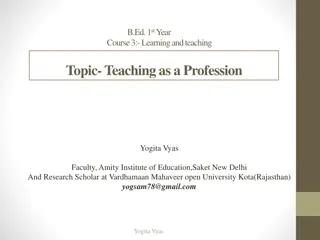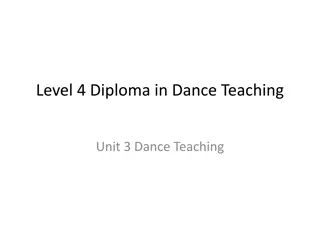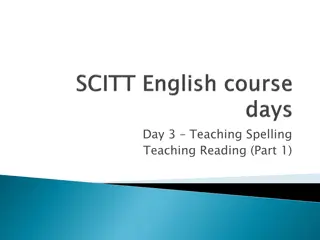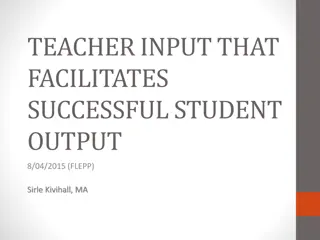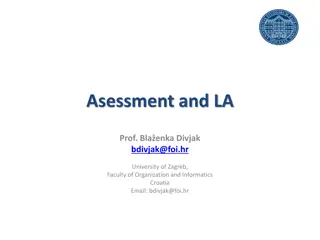Modern Approach to Language Teaching and Assessment
Embrace a student-centric approach in language education by focusing on daily speaking activities, vocabulary building, and performance assessments. Shift away from traditional quizzes and tests towards enabling students to engage in real conversations, understand authentic texts, and present information effectively. Prioritize language proficiency over test scores for a more holistic learning experience.
Download Presentation

Please find below an Image/Link to download the presentation.
The content on the website is provided AS IS for your information and personal use only. It may not be sold, licensed, or shared on other websites without obtaining consent from the author.If you encounter any issues during the download, it is possible that the publisher has removed the file from their server.
You are allowed to download the files provided on this website for personal or commercial use, subject to the condition that they are used lawfully. All files are the property of their respective owners.
The content on the website is provided AS IS for your information and personal use only. It may not be sold, licensed, or shared on other websites without obtaining consent from the author.
E N D
Presentation Transcript
Backward design performance assessments Teacher speaks 100% target language Speaking in the target language is the focus of each day Classroom routine to facilitate speaking Vocabulary building activities Speaking activities Word lists/word wall Assessments
What do you want students to be able to do? Be able to talk about your self and family. Ask a new acquaintance questions about him/herself. Talk about weekend plans with a friend. Talk with your partner about what you did last weekend.
Design activities that will enable students to do well on the performance assessment. The desired outcome shifts from doing well on a lesson quiz and unit test to be able to carry a conversation with a friend, understand an authentic text in the target language and be able to write a short note and present information.
Free up class time by reducing number of lesson quizzes and unit tests One quiz per week; one unit test per month x 8 months = 30 quiz days 8 test days per year. Textbook quizzes may contain vocabulary that doesn t match your priorities now you re teaching something because it s on a textbook test. Eliminate Test and Forget Change classroom routine from . . . Notes Practice Quiz Repeat
Notes (students take notes for homework?) Vocabulary building activities Practice: speaking activities, writing, reading, listening Quizzes used as formative assessments Lessons that flow together with no official stopping point. Lessons longer than one week blending and recycling new and old vocabulary and grammar. Quizzes are an official stopping point and signal an end.
The goal of classroom instruction and homework should be should be to enable students to speak, read, write and understand the language. The goal should not be so that students get an A on a vocabulary quiz, lesson quiz or unit test.
Create performance assessments at longer intervals/less frequency than quizzes/tests Decide what students need to know in order to do well on the performance assessment Provide I can statements so students know the end game Create a variety of tasks that will enable students to do well on the performance assessment Have shorter assessments often to raise the level of concern You can still have some quizzes/vocab. tests but the focus of each lesson shouldn t be the quiz at the end. (quiz in the middle of a lesson)
Use Gestures Cognates Exaggeration White board in English for important information
This requires effort on the teachers part! Require students to use language they already know Post common questions on wall Give students lists of useful expressions they can refer to Build speaking into each day s activities Quick share with partner Question cards Information gap Surveys Target-language only dedicated two-three times per week Class vs class competition Set unit goal as speaking assessment
Seating arrangement to facilitate speaking activities Place desks in groups of four Makes it easier to partner up Makes it easier to identify who does not have a partner If talking is a problem, change student s seat immediately.
La Sonnerie Have a warm up to review previous material or to activate prior knowledge for the day s lesson Ask students questions from la Sonnerie Ask students general questions Speaking activity Students ask each other the questions from la Sonnerie Project the same questions teacher was asking students. Students ask their partner (start with French, later lessons, prompts are in English = Qu est-ce que tu as envie de faire ce soir? Ask your partner what he feels like doing tonight)
Teach lesson Practice Incorporate authentic writing/reading/listening activities Exit card (on back of worksheet)
Students need a lot of vocabulary to have something to say (personal vocab. Terrill) Review vocab. in daily warm up Flash cards (student created) Quizlet Eiffel tower game Dice game Category game Readings that use the same vocabulary (inauthentic and authentic) Power points with vocabulary reuse often
Words and expressions that help the conversation: Really? Are you sure? That s crazy! That s true That s good Words of encouragement Word wall Adjective list, thematic vocabulary
Question Cards Using Tasks Surveys Information gap activities Write three questions you can ask your partner. Role play present task, five minutes to prepare, do in front of the class. Each student must interact and cannot answer in one word answers. Role play/conversation not in front of the class. Free form/performance assessment. Give students specific guidelines of requirements. Tell students you are listening and will randomly grade groups of students and participation points. Dedicated target language-only speaking time
Dedicate five minutes per day where students speak only in the target language. Make it a competition between classes to see which class can talk the longest without anyone speaking English. Hand out Ne parle pas anglais cards (Don t speak English) to anyone you hear speaking English. Students can get rid of card if they catch someone else speaking English. At the end of the five minutes, everyone with a Ne parle pas anglais card must come up in front of the class and speak French on any topic for 30 seconds
A quelle heure est que tu te l ves le weekend A quelle heure est-ce que tu te couches samedi soir ? A quelle heure est- -ce que tu te l ves le weekend ? ? ce A quelle heure est que tu te l ves pendant la semaine A quelle heure est- -ce que tu te l ves pendant la semaine ? ? ce A quelle heure est-ce que tu te couches en g n ral ?
Students work in groups of three Each student is given a different task Students can rotate tasks after each round All answers must be in complete sentences. Examples: Student 1 asks a yes or no question Student 2 answers positively Student 3 answers netatively Do you like pizza?
Have you seen Divergence? Do you study after you eat dinner? Other examples: Opinions student 1 states an opinion. Student 2 agrees, 3 disagrees Frequency student 1 says something he or someone else does. Student 2 always does it, 3 never does it. Today, yesterday, tomorrow student 1 says something he/she is doing now. Student 2 did it yesterday, 3 is going to do it.
Always Always From time to time From time to time never never Do you make your bed? Do you wash the dishes? Do you take walks? Do you do your math homework? Do you watch Netflix?
Circumlocution Give vocab cards to students. They must explain the word other students guess Start with day s warm up Practice as a class with teacher Go over several descritipns Students work with group Recycle words often Draw pictures retell story, etc. Rejoinders Don t just answer yes , but add rejoinder: yes, of course, all the time, I d love to, that sounds great! That s true! You re kidding! Battleship to form sentences in a structured manner Card games
French chat club Padlet Padlet I Padlet 2 Padlet 3
Give students the prompt Students call Google Voice or the classroom desk phone and leave a message. Can be done in the classroom or for homework. Students respond to the prompt and ask a question.
Thinking about the two poems by Verlaine (Il pleure dans mon coeur and Les sanglots longs des violons) and le Dormeur du val by Rimbaud, tell me which one you prefer and why. Ask me a question (remember, lequel means which one) Les mots utiles (use your adjective list): Plus more Moins less la fin the ending le son the sound le ton the tone
Click the grid of dots in the upper right corner of Google page. Click more. Click even more.
You must have clear grading rubrics Can student be understood by a sympathetic native speaker? Does pronunciation or other mistakes impede understanding? Are there some errors that really bug you? Rubrics should enable students with exceptional speaking ability to receive higher than an A. If students meet the requirements = 90% If students exceed = 100%
Pronunciation Vocabulary Grammar Sentences grammatically correct self-corrected when needed Added more information elaborated 5 Good pronunciation Could be understood by a sympathetic native-speaker 4.5 Said what was required One or two errors 3 Needs some practice One-word answers More than two errors 13.5 = A
Skill Rubric Pts Rubric Pts Pronunciation Good pronunciation could be understood by a native speaker Some words pronounced incorrectly causing mis- understanding 5 4 Elaboration Saying more than minim prompt Adding more details than just the requirement (includes the questioner- not just the one answering). Asking the questions: does not include any or minimal additional words. 5 4 Answerer: one word answers or minimal elaboration
Grade periodically while students speaking with a partner Over one-week period, as students are doing various speaking activities, circulate and grade three groups of students (six students per day x five days = 30 students spread over longer days if nec.) Have several speaking activities for students that will take up 30 minutes. Spread speaking assessments over two days one week apart. Advantages: the room isn t quiet Other students are occupied Disadvantages: Some students won t do the speaking activities because you re not watching them.
There is a new TV show in France about the lives of American teenagers. A talent scout has asked you to do a biographical recording about yourself. He will listen to it to see if you would make an interesting character on the show. You really want this gig, but you think your real life is too boring. Make an outlandish recording about yourself to help you get the job.
Langenscheidt Sue Fenton









